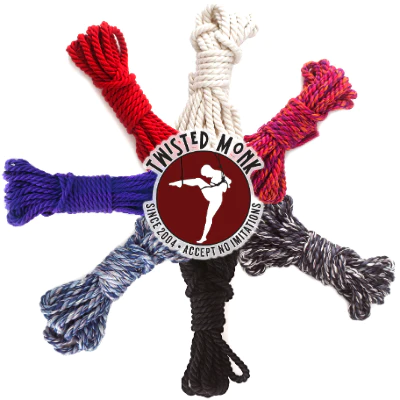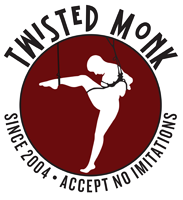Who says you can't do shibari? 🐂 💩
Have you heard or read something like this before? Or maybe you’ve said this or thought this:
"I can't do shibari because… it's a complicated traditional Japanese art form requiring years of proper training and practice under the guidance of a recognized master."
No.
None of this is required.
Why? Well, let's unpack this statement for a practical reality check.
IT'S COMPLICATED…
When you're in the mood for detailed tying, make it so.
If making complex patterns might take you to that meditative, sweet, or pampered state, make it so.
Must it be complicated? No.
In Japan, it's common for private players to tie and bind very simply – and then get on with the other sexy kinky stuff of their pervy play plan.
Even Mr. Norio Sugiura, the brilliant OG of shibari art photos, often prefers to keep it simple, focusing on the mood and romance of the tableaux.

( ©norio sugiura 2022
www.sugiuranorio.jp/portfolio/phtoto-book-e/ )
Outside of Japan, many people first learn about shibari from images of performances, porn, professional or amateur photoshoots, or social media thirst traps. Because of this, there's a common and skewed belief that everything shibari should look like those.
It's the same as thinking you're not sexy if you don't look like a lingerie model or that "good" sex should look just like porn. That's just plain toxic and not good for any of us. Sometimes it's fun to get detailed, and sometimes focusing on detail takes away from the fun. Vary the ties' complexity to align with that moment's intentions.
…TRADITIONAL JAPANESE ART FORM…
There's so much to unravel and examine here.
Shibari can be beautiful, artistic, artful, and even moving. It can also be art or used to serve a larger work of art. Then there is the deeper discussion of 'what is art?' Artists, philosophers, historians, and critics have wrestled and argued over this for generations. And let's not forget the question asked by the average connoisseur standing before a Jackson Pollock painting.
I am uncomfortable and suspicious when "art" is used pretentiously or to reject and distance itself from its sexual and erotic roots. "Art-washing" prettily covers up lurking sex negativity, cultural appropriation, and erasure of the marginalized (such as sex workers)
To learn about the roots and romanticization of shibari, please read this
…REQUIRING YEARS OF PROPER TRAINING…
Required? No.
What's 'proper training' anyway? I suspect people mean this to be structured or formal small-group education or programs with tangible progress-based curricula.
Some people enjoy extensive learning and find satisfaction in structured programs. Some love measurable metrics of progress. If this sound like you, then go for it!
But that's not for everyone.
Additionally, the appeal of formal or organized education will wax and wane over time for individuals.
Many systematized program center around in-person group education. Structured group learning serves many different purposes and joys for many different people.
Social interaction and conversation.
Friendly competition.
Satisfaction in measurable progress and challenges.
Sense of gameplay.
Desire to belong, to find one's "people."
Flirting.
Having people appreciate you and your skills.
Finding nice and suitable practice partners more easily.
Dating.
Validation.
Possibly preferable for those who like hands-on learning with other people.
It's just as likely that structured socially-centered learning may not be suitable or desirable for a person.
Someone with concerns of privacy.
People who don't enjoy close quarters with others.
Those who live far away from such gatherings.
Financial and resource limitations.
No time! Work, family & responsibilities take precedence.
Competitive social environments can lead to negative feelings, self-judgement, or toxic self-criticism.
Participation would violate relationship agreements or upset their partners.
People who get frustrated or feel limited in hierarchical or standards-based learning environments.
People who prefer to learn at their own pace rather than follow an instructor.
…WITH TRAINING UNDER THE GUIDANCE OF A RECOGNIZED MASTER.
Today there are many people with extensive and beautiful skills with rope. Some of these people also teach or share their talents with others. Of these, some teach effectively, and others do not. Anyone who shares and teaches starts off stumbling and crafting their style as they go. (Interested in teaching? Check out Shay Tiziano's book "Creating Captivating Classes: A Guide for Kink, Sexuality, and Relationship Presenters.")
Of those who teach well, they may or may not be the right teacher for you and your unique learning style. If a teacher or their methods suit you, fantastic! But they may not be the right ones for your friend. Not everyone who ties beautifully is good at explaining and sharing. Here are a few points you might consider when looking for a good teacher.
- Top, bottom, or switch?
Doesn't matter. Really. I'm not kidding.
How a person leans towards or identifies in play does not indicate how or what they teach.
Having first-hand experience with rope is absolutely important. It's great if they've encountered problems, found solutions, and learned through challenges in scenes and actual play. Look for someone with understanding of interpersonal communication and emotional experience in-scene.
Ask yourself, "what about rope do I want to learn?"
Find a person whose repertoire, interests, and focus match yours. If you have many different learning goals and reasons for rope, it makes sense to seek different people and resources to learn from. For example, you may be interested in shibari for private erotic play with a lover but also want to create stage performances and rope choreography. These are two very different directions. It's possible that there might be one person in your area who can competently teach that to you in ways that make sense to you. It's also very likely that there isn't.
You don't need to look for an educational unicorn.
- Gender and orientation?
When it comes to who is listed or recommended as rope teachers, have you noticed the disproportionate representation of cis male tops topping women?
Unfortunately, this is a common bias.
Assumptions of the competence and quality of cis male leadership are a sad norm in most mainstream organizations, occupations, and hobbies. Rope and kink education is part of the larger society, so it shares this bias.
But don't despair! We can get past this.
People of any orientation or gender may be the right teachers for you. Choose based on your learning objectives and what makes you happy and your personally optimal learning conditions.
You might seek someone whose gender or orientation reflects yours. Someone of the gender of your play partners might provide valuable insights. Or you might find gender or orientation not relevant to your needs.
The same applies to other demographics and profile details such as age, cultural background, language, etc.
- Certification and wide recognition?
Nope.
Unlike nurses, therapists, physicians, or lawyers, no national or international certification system exists for shibari and rope play. A local group or individual instructors can create their own evaluation or 'certification' system. This is relevant to them, and it's not universal.
It's OK to learn from many people – in fact it's great to learn from many people, different styles, philosophies, and sources. You might learn from many concurrently or over time.
Is it better to learn everything from one person?
Probably not.
Even if you connect with the most amazing person to help you, you can always learn new perspectives or skills from other people and sources. To develop your unique style and ways, see what styles and ways are out there.
There is no one true way. (But you already knew that.)
Notice who's around you. You just might find a good person to learn a sweet bit of information in a friend or someone you met at a kinky social event. Your partner, who might only have the same experience as you, can also be a great source to learn from – if you're paying attention. What could you possibly learn from an inexperienced partner? They may not be an expert at knots or ties, but they are the ultimate expert of their own body and pleasures. By listening and paying attention, you learn how to create the experience needed for that moment.
Cast your search widely and creatively to find good teaching that's accessible and right for you.
To wrap up and tie this all together (haha) -- just sidestep this supposedly reverential 🐂 💩 .
Here's a new phrase, no BS, for your good times.
"I can do shibari because… It's as simple or complex as I want it to be. Its roots are in Japanese sexual folk craft, and my style and I are part of its evolving family tree. I can dive in for immediate fun and enjoy years of exploration while learning from many wonderful people and sources."
-- -- -- --
Midori's Bio
Trailblazing educator, sexologist, artist, and irritant to banality, Midori founded Rope Dojo and ForteFemme: Women's Dominance Intensive. She penned the first English instruction book on shibari titled "Seductive Art of Japanese Bondage" in 2001, paving the way for the popularity of rope. Dan Savage calls her the "Super Nova of Kink," while others affectionately call her Auntie Midori for her cool, tell-it-like-it-is, funny, reality-based teaching. She is also the author of "Wild Side Sex," "Master Han's Daughter," and "Silk Threads."
During this pandemic, learn, laugh, and enjoy her special online classes, events, and art at www.patreon.com/PlanetMidori
Instagram: https://www.instagram.com/planetmidori/
Facebook: https://www.facebook.com/MidoriReallyMidori
Creative Living Coaching and Private Sexological Consultations: ask@planetmidori.com
Also in News

Exotic Bamboo Rope Review by Pete Riggs of Ropeconnections.com
Pete Riggs of Ropeconnections.com recently did a very through and in depth review of our exotic bamboo ropes, including washing! Check it out, along with tons of other great rope content and tutorials!


